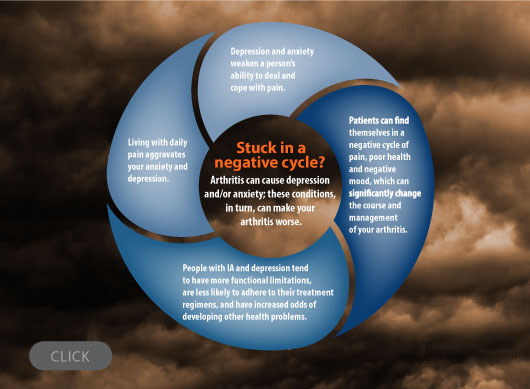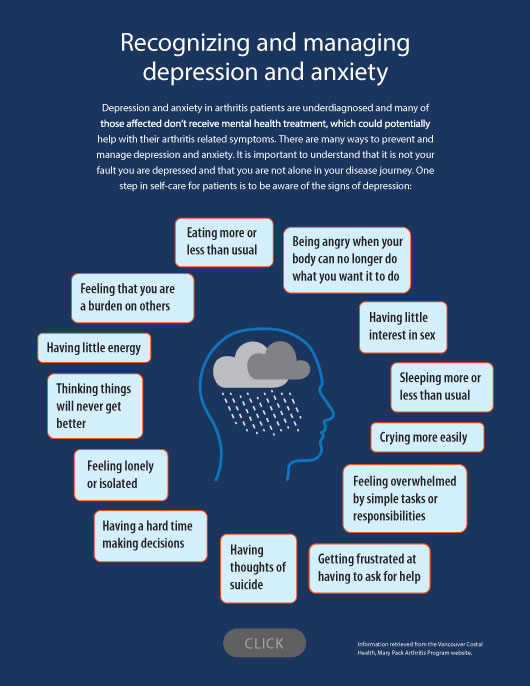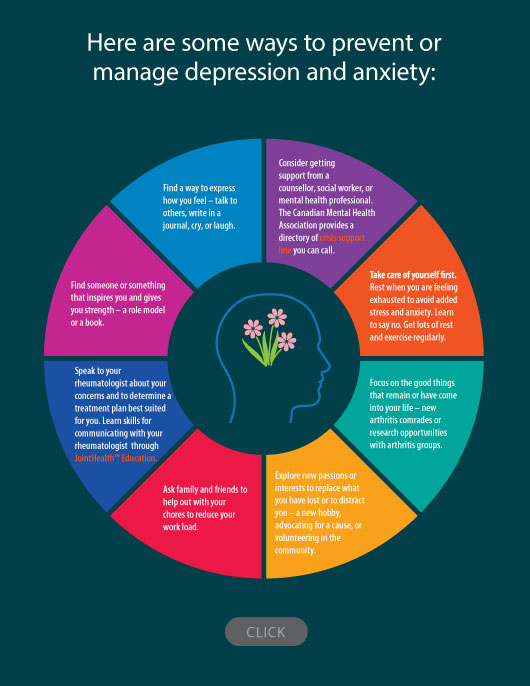In this issue
- Mental health and arthritis:
a complex relationship - Depression and anxiety, “brain fog”, and inflammatory arthritis
- The burden of depression
- Recognizing and managing depression and anxiety
- Here are some ways to prevent or manage depression and anxiety
- Love, sex, and arthritis
JointHealth™ insight Published February 2019
Mental health and arthritis:
a complex relationship
In this issue of JointHealth™ insight, we focus on the important relationship between mental health and arthritis. People with inflammatory arthritis (IA) are more likely to experience mental health conditions such as depression, anxiety and “brain fog” than the general population. Recent research suggests there is a complex relationship between these conditions and arthritis, and the impacts are profound. People with osteoarthritis (OA) may also experience depression as a result of new and significant physical limitations. There are effective ways that people with arthritis can manage their mental health.
This issue will cover the following:

Depression and anxiety, “brain fog”,
and inflammatory arthritis

People living with inflammatory arthritis (IA), such as rheumatoid arthritis (RA), spondyloarthritis, psoriatic arthritis and lupus experience physical and emotional challenges. Research shows that people with IA are more likely to experience depression and/or anxiety than the general population; people with RA are 17-20% more likely to develop depression.
One theory is that mental health disorders are an outcome of the pain and disability associated with arthritis. For example, new limitations caused by IA can bring significant changes to one’s life, work and relationships, leading to anxiety and depression.
We know that pain and disability are linked to depression in arthritis, but there is now growing evidence that inflammation also plays a role. For example, researchers at the University of Glasgow found that chronic inflammation from IA, which affects joints and organs, such as the eyes, skin, and the brain, may also be related to mental health disorders like depression1.
“Brain fog” is another symptom of IA. “Brain fog” can create episodes of confusion, disorientation and frustration. Patients are unable to think clearly, concentrate and have problems with memory. Results from a 2018 study published in Nature Communications linked RA inflammation with how messages about your inflammation are transmitted between your brain and your central nervous system2. Researchers believe these brain changes are the reason behind fatigue, pain, and an impaired ability to think.
Arthritis Consumer Experts is a partner in a study on preventing complications related to inflammation such as skin, join and bowel conditions. The PRECISION research project is expected to end this year and could support more than 5 million Canadians to live better, longer lives, and has potential to save money being spent on treating complications. To learn more about the project, visit arthritisresearch.ca. Another useful tool developed by Arthritis Research Canada is the Arthritis Health Journal, which uses the Patient Health Questionnaire 9 (PHQ-9) scale to screen for depression. It does not replace an evaluation by a doctor, but can help identify symptoms of depression. Be one of the first people to use the Arthritis Health Journal by participating in the pilot study.
1 Nerurker L, Siebert S, et al. Rheumatoid arthritis and depression: an inflammatory perspective. The Lancet Psychiatry. Volume 6, Issue 2, P164-173. October, 2018. DOI:https://doi.org/10.1016/S2215-0366(18)30255-4
2 Scherpf A, Kaplan c, et al. A multi-modal MRI study of the central response to inflammation in rheumatoid arthritis. Nature Communications. Volume 9, Issue 1, P2243. June, 2018. DOI https://doi.org/10.1038/s41467-018-04648-0
The burden of depression

On the effectiveness of biologic medications…
Biologics are an important treatment option for different forms of inflammatory arthritis. A 2018 study published in Rheumatology found that experiencing symptoms of depression at the start of biologics treatment (at baseline) is associated with reduced treatment response, and over time, impacts change in disease activity3. The researchers found that depression at baseline contributes to approximately 30% reduced odds of good biologics treatment response in RA. Furthermore, patients who reported a history of depression or experienced symptoms of depression were more likely to switch biologics. The study recommends patients should receive repeated screening and management of their mental disorder from their rheumatologist and rheumatology nurse.

At work…
A study conducted at West Virginia University last year found that the people who had both RA and depression experienced more work-related challenges and lower productivity than those living with only RA4. This means that employees with RA and depression were more likely to miss days of work, be unemployed, or experience functional limitations at work compared to those in the latter group. People in the former group had significantly higher annual healthcare expenditures ($14,752 versus $10,541).

On Lifestyle…
Arthritis pain and depression, compounded by inflammation and fatigue, are instant life changing conditions. All of these health challenges may cause you to engage less in physical and social activity, feel isolated, and experience poor sleep quality. These negative changes in your lifestyle can increase your pain and dampen your overall mood – making your depression worse.
3 Matcham F, Davis R, et al. The relationship between depression and biologic treatment response in rheumatoid arthritis: An analysis of the British Society for Rheumatology Biologics Register. Rheumatology. Volume 57, Issue 5, P835-843. May, 2018. DOI http
4 Deb A, Dwibedi N, et al. Burden of Depression among Working-Age Adults with Rheumatoid Arthritis. Arthritis. June, 2018. DOI 10.1155/2018/8463632


Listening to you
We hope you find this information of use. Please tell us what you think by writing to us or emailing us at feedback@jointhealth.org. Through your ongoing and active participation, ACE can make its work more relevant to all Canadians living with arthritis.
Update your email or postal address
Please let us know of any changes by contacting ACE at feedback@jointhealth.org. This will ensure that you continue to receive your free email or print copy of JointHealth™ insight.
Arthritis Consumer Experts (ACE)
Who We Are
Arthritis Consumer Experts (ACE) operates as a non-profit and provides free research based education and information to Canadians with arthritis. We help (em)power people living with all forms of arthritis to take control of their disease and to take action in healthcare and research decision making. ACE activities are guided by its members and led by people with arthritis, scientific and medical experts on the ACE Advisory Board. To learn more about ACE, visit www.jointhealth.org
Disclosures
Over the past 12 months, ACE received grants-in-aid from: Arthritis Research Canada, Canadian Biosimilars Forum, Canadian Institutes of Health Research, Canadian Rheumatology Association, Eli Lilly Canada, Hoffman-La Roche Canada Ltd., KT Canada, Merck Canada, Novartis, Pfizer Canada, Sandoz Canada, Sanofi Canada, St. Paul's Hospital (Vancouver), UCB Canada, and the University of British Columbia.
ACE also received unsolicited donations from its community members (people with arthritis) across Canada.
ACE thanks funders for their support to help the nearly 6 million Canadians living with osteoarthritis, rheumatoid arthritis, psoriatic arthritis, ankylosing spondylitis and the many other forms of the disease.
Disclaimer
The material contained on this website is provided for general information only. This website should not be relied on to suggest a course of treatment for a particular individual or as a substitute for consultation with qualified health professionals who are familiar with your individual medical needs. Should you have any healthcare related questions, you should contact your physician. You should never disregard medical advice or delay in seeking it because of something you have read on this or any website.
This site may provide links to other Internet sites only for the convenience of World Wide Web users. ACE is not responsible for the availability or content of these external sites, nor does ACE endorse, warrant or guarantee the products, services or information described or offered at these other Internet sites.
Although the information presented on this website is believed to be accurate at the time it is posted, this website could include inaccuracies, typographical errors or out-of-date information. This website may be changed at any time without prior notice.
Mental health and arthritis:
a complex relationship
In this issue of JointHealth™ insight, we focus on the important relationship between mental health and arthritis. People with inflammatory arthritis (IA) are more likely to experience mental health conditions such as depression, anxiety and “brain fog” than the general population. Recent research suggests there is a complex relationship between these conditions and arthritis, and the impacts are profound. People with osteoarthritis (OA) may also experience depression as a result of new and significant physical limitations. There are effective ways that people with arthritis can manage their mental health.
This issue will cover the following:
- Relationships between depression, "brain fog" and inflammatory arthritis
- Burden of depression
- Recognizing and managing depression and anxiety
- Prevent depression and anxiety
- Love, sex and arthritis*

Depression and anxiety, “brain fog”,
and inflammatory arthritis

People living with inflammatory arthritis (IA), such as rheumatoid arthritis (RA), spondyloarthritis, psoriatic arthritis and lupus experience physical and emotional challenges. Research shows that people with IA are more likely to experience depression and/or anxiety than the general population; people with RA are 17-20% more likely to develop depression.
One theory is that mental health disorders are an outcome of the pain and disability associated with arthritis. For example, new limitations caused by IA can bring significant changes to one’s life, work and relationships, leading to anxiety and depression.
We know that pain and disability are linked to depression in arthritis, but there is now growing evidence that inflammation also plays a role. For example, researchers at the University of Glasgow found that chronic inflammation from IA, which affects joints and organs, such as the eyes, skin, and the brain, may also be related to mental health disorders like depression1.
“Brain fog” is another symptom of IA. “Brain fog” can create episodes of confusion, disorientation and frustration. Patients are unable to think clearly, concentrate and have problems with memory. Results from a 2018 study published in Nature Communications linked RA inflammation with how messages about your inflammation are transmitted between your brain and your central nervous system2. Researchers believe these brain changes are the reason behind fatigue, pain, and an impaired ability to think.
Arthritis Consumer Experts is a partner in a study on preventing complications related to inflammation such as skin, join and bowel conditions. The PRECISION research project is expected to end this year and could support more than 5 million Canadians to live better, longer lives, and has potential to save money being spent on treating complications. To learn more about the project, visit arthritisresearch.ca. Another useful tool developed by Arthritis Research Canada is the Arthritis Health Journal, which uses the Patient Health Questionnaire 9 (PHQ-9) scale to screen for depression. It does not replace an evaluation by a doctor, but can help identify symptoms of depression. Be one of the first people to use the Arthritis Health Journal by participating in the pilot study.
1 Nerurker L, Siebert S, et al. Rheumatoid arthritis and depression: an inflammatory perspective. The Lancet Psychiatry. Volume 6, Issue 2, P164-173. October, 2018. DOI:https://doi.org/10.1016/S2215-0366(18)30255-4
2 Scherpf A, Kaplan c, et al. A multi-modal MRI study of the central response to inflammation in rheumatoid arthritis. Nature Communications. Volume 9, Issue 1, P2243. June, 2018. DOI https://doi.org/10.1038/s41467-018-04648-0
The burden of depression

On the effectiveness of biologic medications…
Biologics are an important treatment option for different forms of inflammatory arthritis. A 2018 study published in Rheumatology found that experiencing symptoms of depression at the start of biologics treatment (at baseline) is associated with reduced treatment response, and over time, impacts change in disease activity3. The researchers found that depression at baseline contributes to approximately 30% reduced odds of good biologics treatment response in RA. Furthermore, patients who reported a history of depression or experienced symptoms of depression were more likely to switch biologics. The study recommends patients should receive repeated screening and management of their mental disorder from their rheumatologist and rheumatology nurse.

At work…
A study conducted at West Virginia University last year found that the people who had both RA and depression experienced more work-related challenges and lower productivity than those living with only RA4. This means that employees with RA and depression were more likely to miss days of work, be unemployed, or experience functional limitations at work compared to those in the latter group. People in the former group had significantly higher annual healthcare expenditures ($14,752 versus $10,541).

On Lifestyle…
Arthritis pain and depression, compounded by inflammation and fatigue, are instant life changing conditions. All of these health challenges may cause you to engage less in physical and social activity, feel isolated, and experience poor sleep quality. These negative changes in your lifestyle can increase your pain and dampen your overall mood – making your depression worse.
3 Matcham F, Davis R, et al. The relationship between depression and biologic treatment response in rheumatoid arthritis: An analysis of the British Society for Rheumatology Biologics Register. Rheumatology. Volume 57, Issue 5, P835-843. May, 2018. DOI http
4 Deb A, Dwibedi N, et al. Burden of Depression among Working-Age Adults with Rheumatoid Arthritis. Arthritis. June, 2018. DOI 10.1155/2018/8463632


Love, sex, and arthritis
Emotional and physiological symptoms of arthritis can impact your relationships with family, friends and romantic or sexual partners.
Below is an excerpt from Rheumatoid Arthritis: Plan to Win with tips to manage arthritis symptoms during sexual activity or intimacy:
Emotional and physiological symptoms of arthritis can impact your relationships with family, friends and romantic or sexual partners.
"From my perspective, chronic pain suffered by one partner definitely ends up impacting the lives of both partners, so sharing your feelings, concerns, and desires is a really positive first step to enjoying your sex life again.” - An IA patientThe benefits of sex and physical contact (like hugging) include improving bonds and building trust between people, helping to reduce pain, promoting sleep, reducing stress, boosting immunity, burning calories, improving self-esteem and heart health.
Below is an excerpt from Rheumatoid Arthritis: Plan to Win with tips to manage arthritis symptoms during sexual activity or intimacy:
- Talk to your partner about what you like and don’t like, what hurts and doesn’t hurt. Be open about how both of you feel and come up with solutions that work for both of you. If you are finding these conversations difficult, you may benefit from seeing a sex therapist.
- Time your medication accordingly if you think it may impact your physical ability and mental mindset to partake in sexual activities.
- Communicate your daily level of pain and fatigue by using a number scale.
- Try different sex positions. Use well-placed padding, pillows, or wedge-shaped pillows to help ease joint pain and provide more comfortable position options.
Listening to you
We hope you find this information of use. Please tell us what you think by writing to us or emailing us at feedback@jointhealth.org. Through your ongoing and active participation, ACE can make its work more relevant to all Canadians living with arthritis.
Update your email or postal address
Please let us know of any changes by contacting ACE at feedback@jointhealth.org. This will ensure that you continue to receive your free email or print copy of JointHealth™ insight.
Arthritis Consumer Experts (ACE)
Who We Are
Arthritis Consumer Experts (ACE) operates as a non-profit and provides free research based education and information to Canadians with arthritis. We help (em)power people living with all forms of arthritis to take control of their disease and to take action in healthcare and research decision making. ACE activities are guided by its members and led by people with arthritis, scientific and medical experts on the ACE Advisory Board. To learn more about ACE, visit www.jointhealth.org
Disclosures
Over the past 12 months, ACE received grants-in-aid from: Arthritis Research Canada, Canadian Biosimilars Forum, Canadian Institutes of Health Research, Canadian Rheumatology Association, Eli Lilly Canada, Hoffman-La Roche Canada Ltd., KT Canada, Merck Canada, Novartis, Pfizer Canada, Sandoz Canada, Sanofi Canada, St. Paul's Hospital (Vancouver), UCB Canada, and the University of British Columbia.
ACE also received unsolicited donations from its community members (people with arthritis) across Canada.
ACE thanks funders for their support to help the nearly 6 million Canadians living with osteoarthritis, rheumatoid arthritis, psoriatic arthritis, ankylosing spondylitis and the many other forms of the disease.
Disclaimer
The material contained on this website is provided for general information only. This website should not be relied on to suggest a course of treatment for a particular individual or as a substitute for consultation with qualified health professionals who are familiar with your individual medical needs. Should you have any healthcare related questions, you should contact your physician. You should never disregard medical advice or delay in seeking it because of something you have read on this or any website.
This site may provide links to other Internet sites only for the convenience of World Wide Web users. ACE is not responsible for the availability or content of these external sites, nor does ACE endorse, warrant or guarantee the products, services or information described or offered at these other Internet sites.
Although the information presented on this website is believed to be accurate at the time it is posted, this website could include inaccuracies, typographical errors or out-of-date information. This website may be changed at any time without prior notice.
